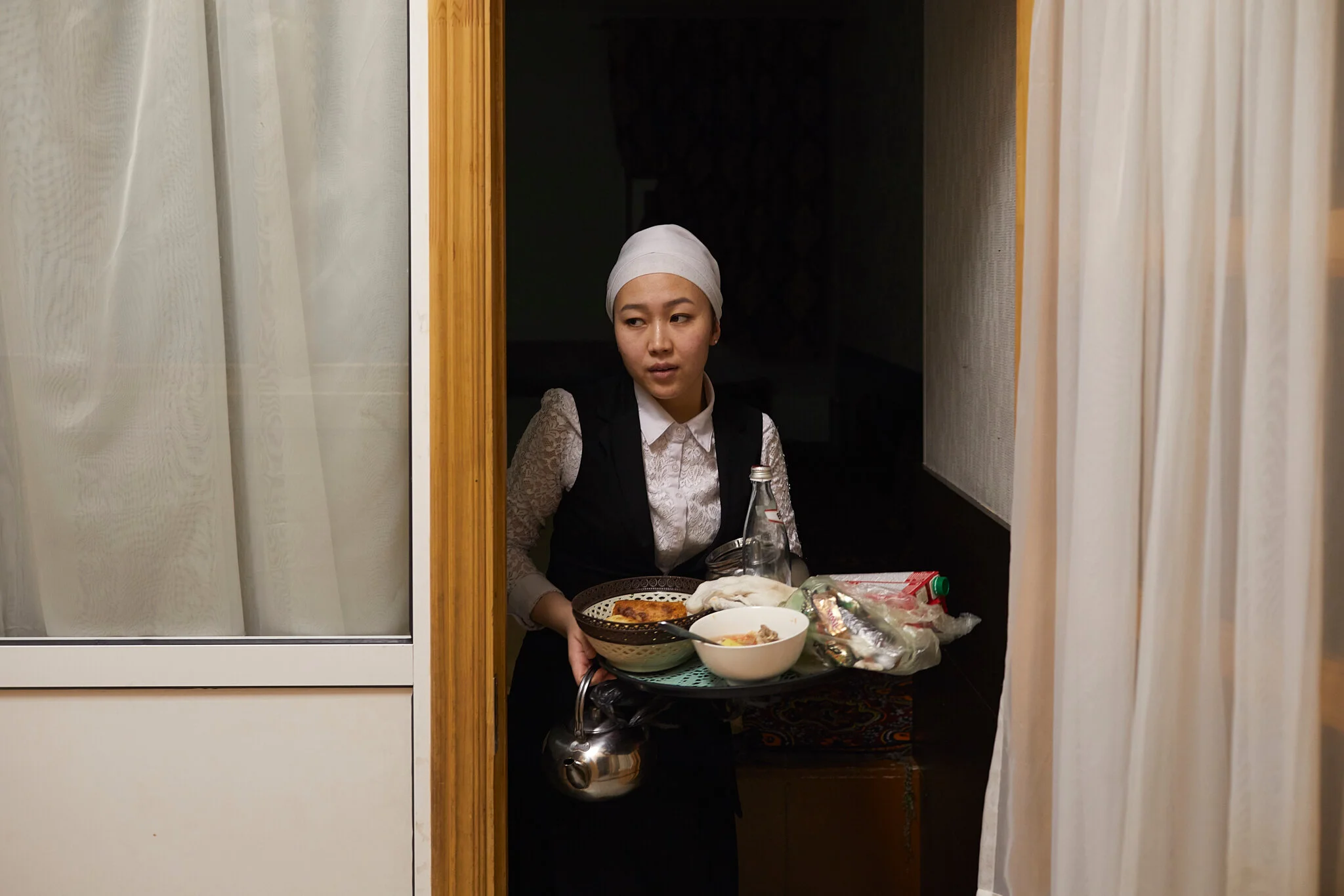
Russia, Moscow, chaikhana “Uzgen”, 04/10/2019. Tahmina K., 25, cleans up after guests at a chaikhana, or Central Asian teahouse, in Moscow. Tahmina sends money back home to Kyrgyzstan to support her mother, who cares for Tahmina’s four-year-old daughter. This is her second time living and working in Russia—her first, a six-year stint, began when she was 13.
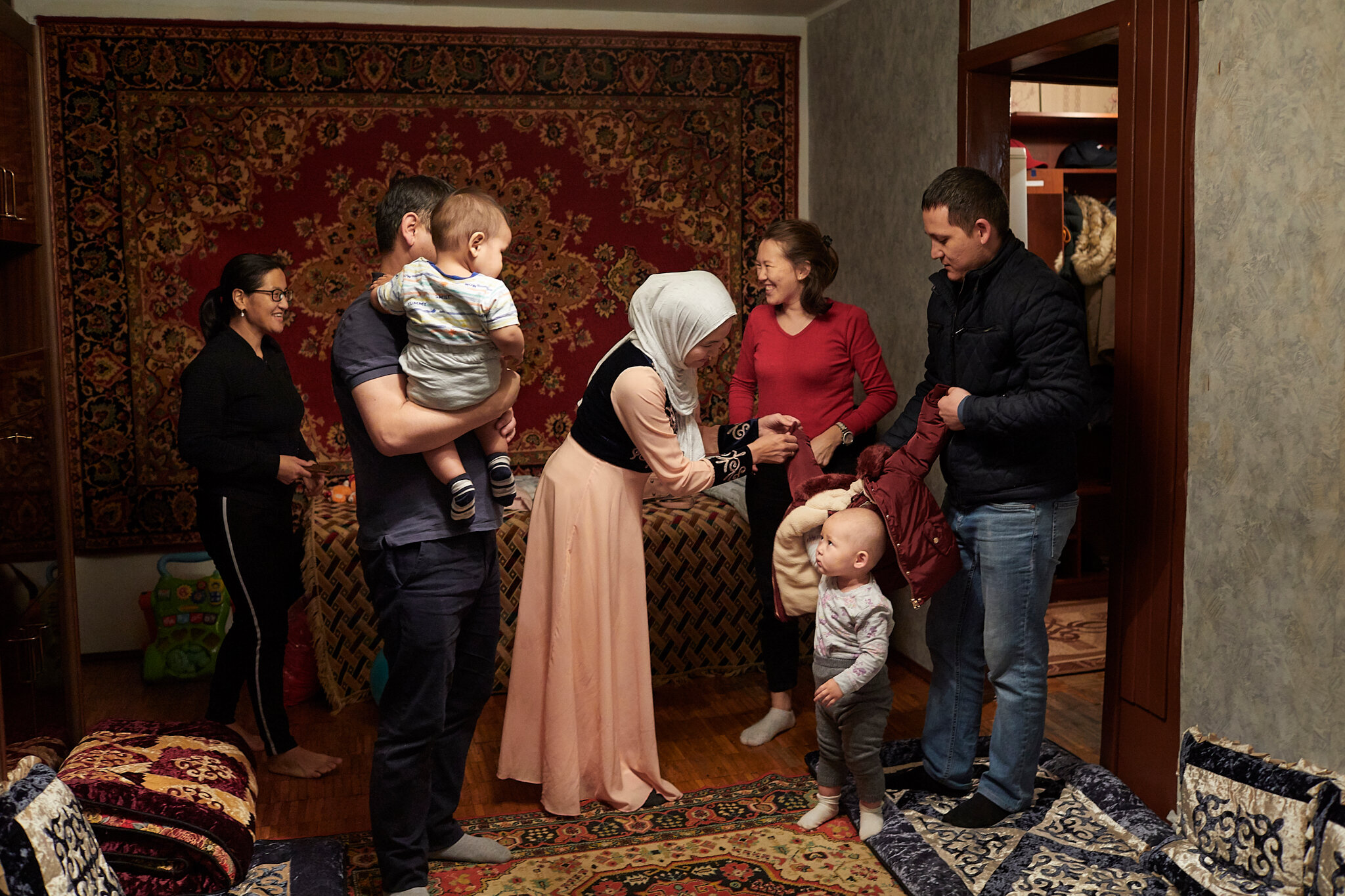
Russia, Moscow, 07/10/2019. Shahrizada Adanova (center, in hijab) welcomes friends at her home in Moscow to celebrate husband Kurmanek Shermatov’s (at left, holding their son Kagan) birthday. Shahrizada first came to Russia from Kyrgyzstan when she was 19 and took jobs as a department store cleaner and a cook. She moved back to Kyrgyzstan two years later and worked for the national television station but longed to return to Moscow. She met Kurmanek, a Kyrgyz mining engineer living in Russia, online and moved back to Russia three years ago.
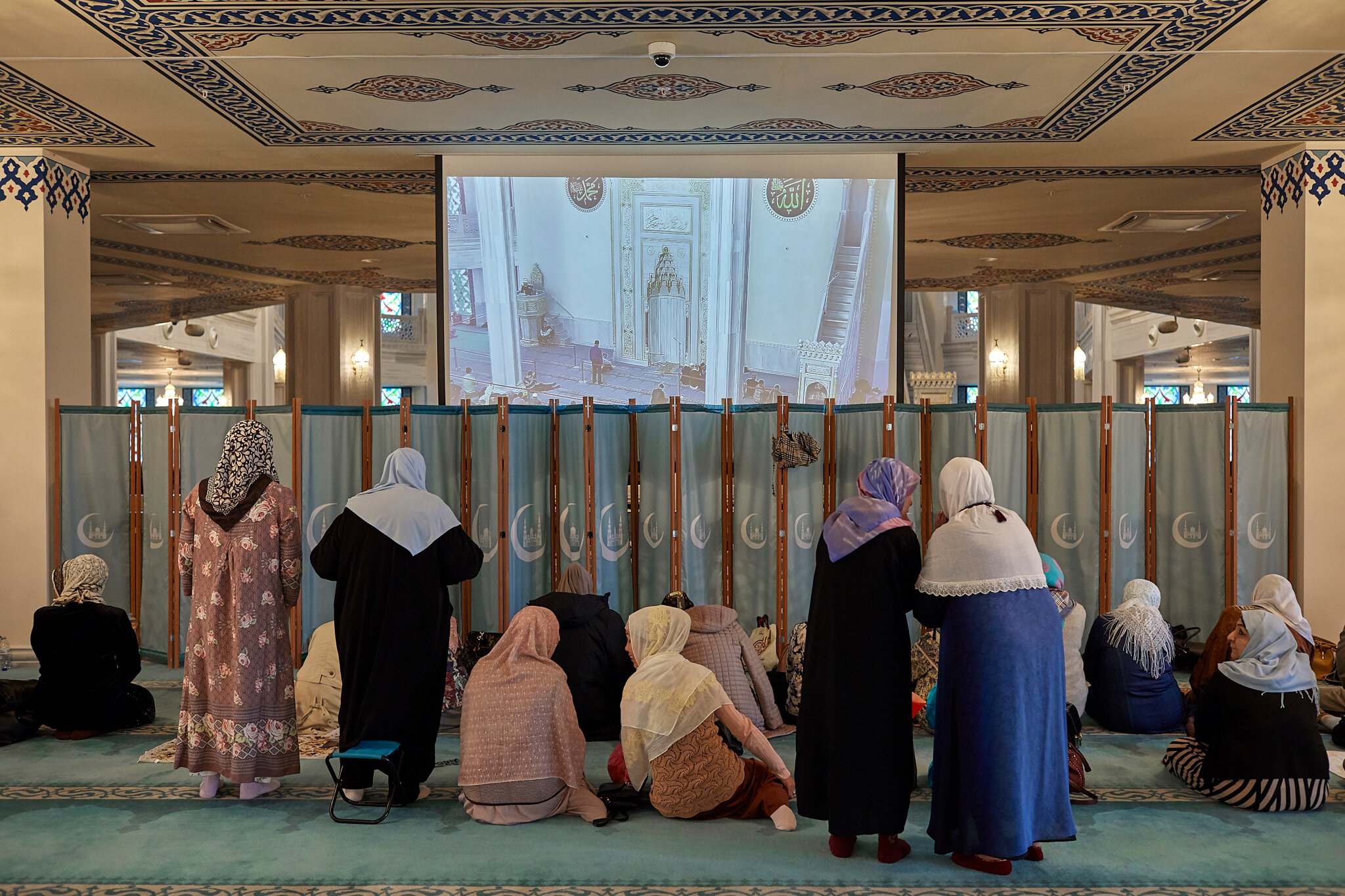
Russia, Moscow, Moscow Cathedral mosque, 04/10/2019. Women are waiting for the Friday prayer to begin. Women and men have separated areas. A big screen is installed so that women can see the imam. The Friday prayer or Jumu'ah is led by a sermon given by Imam (the leader of the mosque) to educate, guide and propagate Islam. Jumu'ah is obligatory for Muslim men who are above the age of puberty and meet certain requirements to pray in congregation either in the mosque of the city they live in or with a group of Muslims. Women are recommended to also do so at home, but not obligated.They all sit down facing the front of the mosque, which will be in the direction of Mecca. This direction is called the qiblah. Wherever a Muslim is praying, he or she is required to face the qiblah before beginning. The qiblah is easily recognizable in a mosque thanks to a structure called the mihrab, or prayer.
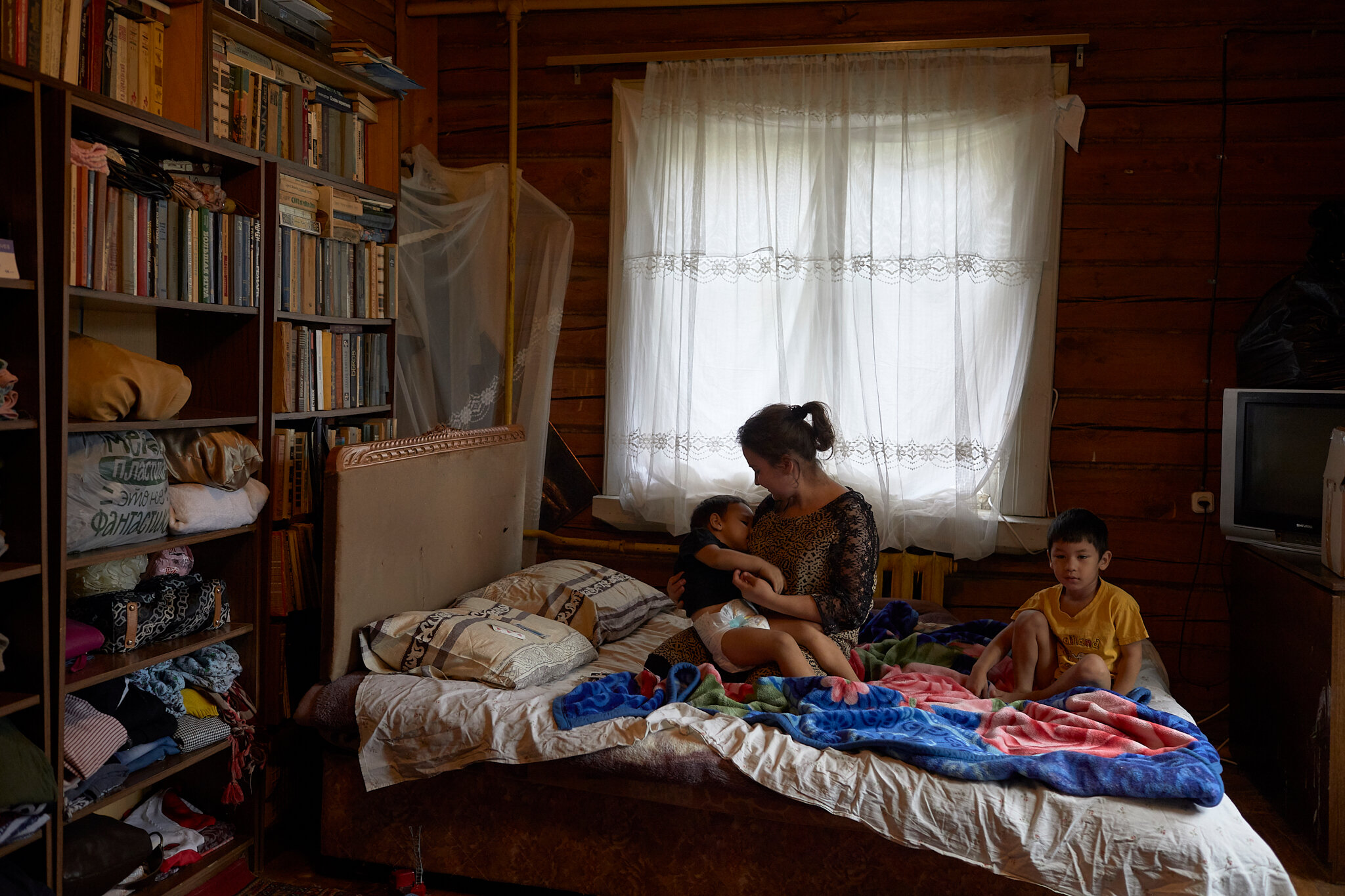
Russia, Moscow oblast, Odintsovo city district, Perhushkovo village, 05/10/2019. Zarina U., 19, takes care of brothers Elyor, five (at right), and Elnur, three, in a village outside Moscow. Zarina’s mother and the boys’ grandmother, friends back in Uzbekistan, arranged for Zarina to go to Russia to stay with them while their parents work. Zarina’s mother is saving Zarina’s wages to build a family house in Uzbekistan. Zarina was supposed to return home in 2020, but after the border was closed because of COVID-19, she moved to Moscow to work.
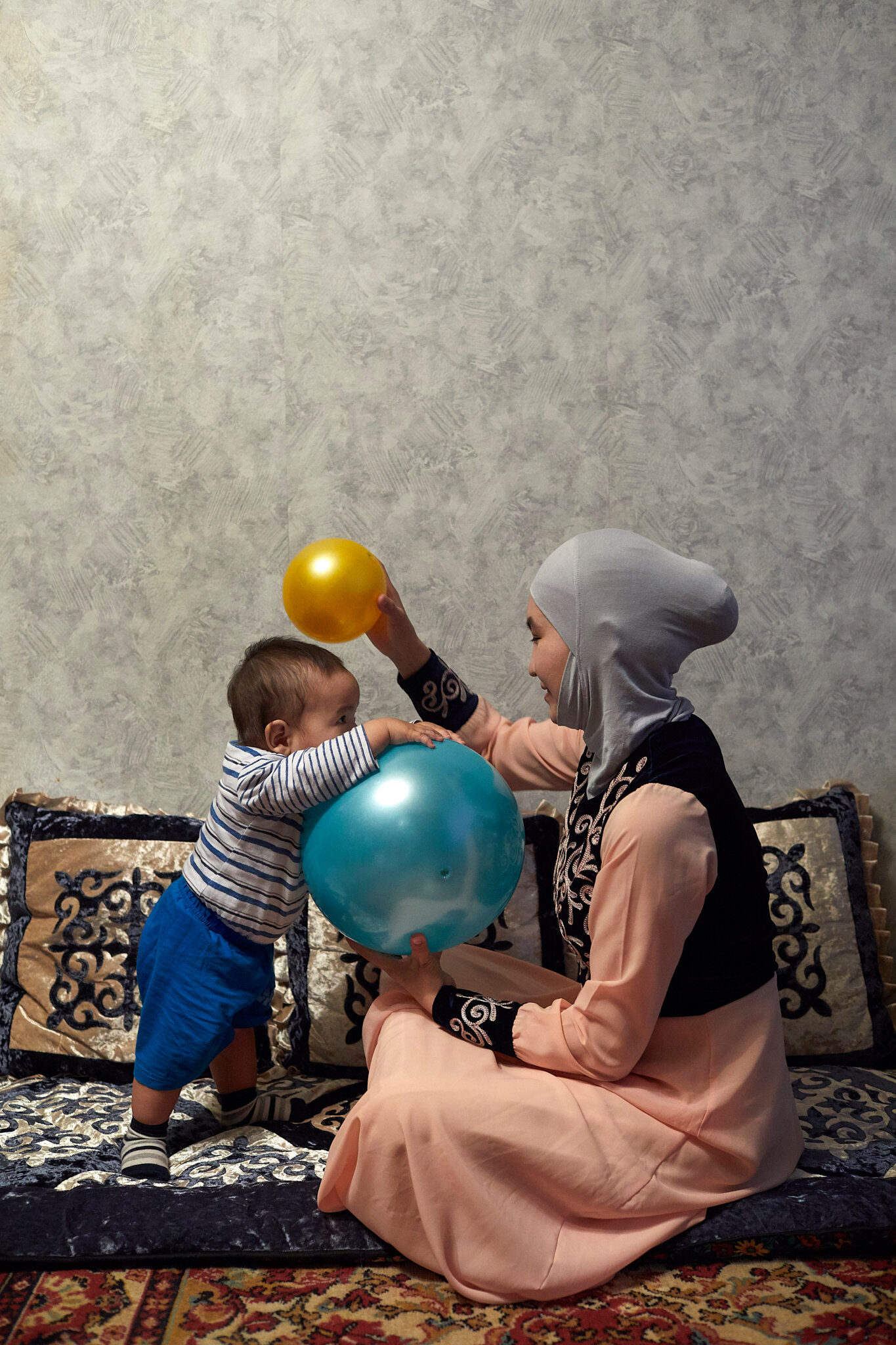
Russia, Moscow, 07/10/2019. Shahrizada plays with eight-month-old Kagan. She started the Aiymdar KG organization to help other Kyrgyz women in Moscow navigate life in Russia and to provide a safe space to talk about relationships and family matters. A dozen women run the organization, which serves some 200 women and raises money for scholarships for 10 orphaned children back in Kyrgyzstan.
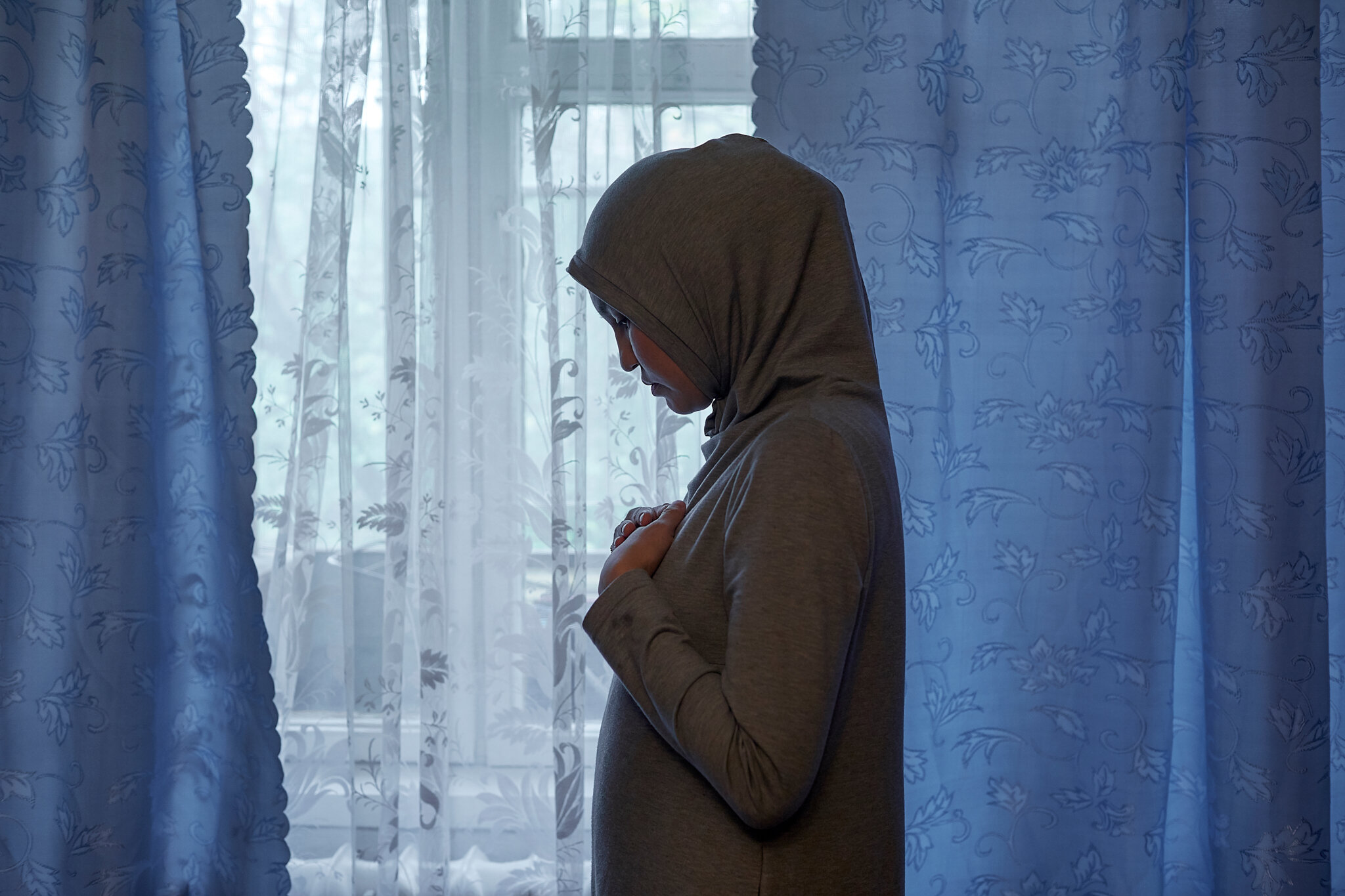
Russia, Moscow, 11/10/2019. As a Muslim Shahrizada Adanova prays five times a day. She first came to Russia from Kyrgyzstan when she was 19 and took jobs as a department store cleaner and a cook. She moved back to Kyrgyzstan two years later and worked for the national television station but longed to return to Moscow. Shahrizada met Kurmanek, a Kyrgyz mining engineer living in Russia, online and moved back to Russia three years ago. She started the Aiymdar KG organization to help other Kyrgyz women in Moscow navigate life in Russia and to provide a safe space to talk about relationships and family matters. A dozen women run the organization, which serves some 200 women and raises money for scholarships for 10 orphaned children back in Kyrgyzstan.
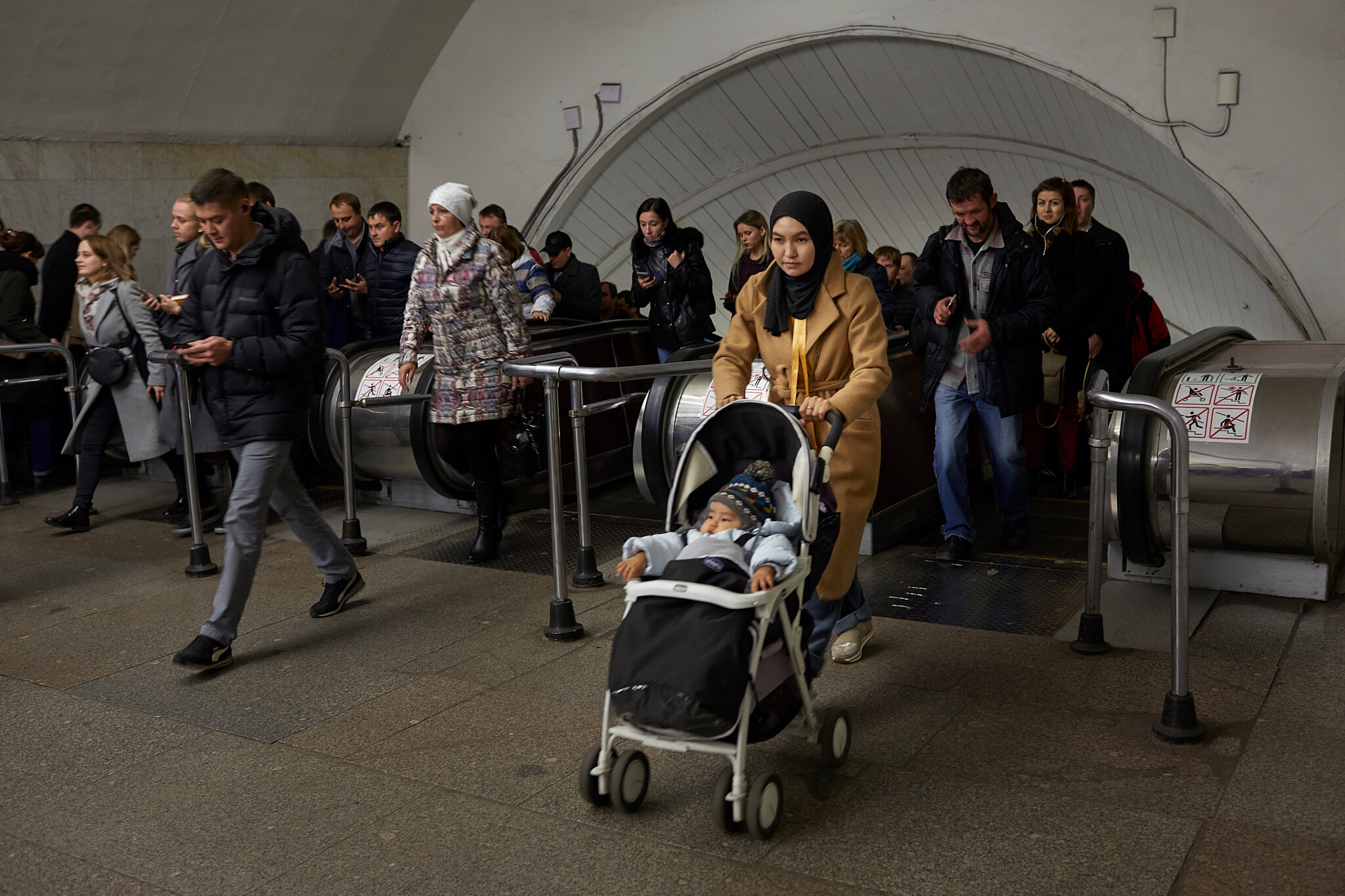
Russia, Moscow, 08/10/2019. Shahrizada Adanova (26) with her 8-months old son Kagan Adanov rides the Moscow subway to her show-room. Shahrizada came alone to Moscow when she was 19. She worked as a cleaner in the big department store, then as a helper in the kitchen, then as a cook. At the age of 21 she moved back to Kyrgyzstan and worked there at the national television, but she missed Moscow and wanted to come back. While in Kyrgyzstan she met online a man from Kyrgyzstan, who lived in Moscow. Shortly they got married and it’s been 3 years since she moved to Moscow. They have a 8-month old boy. Shahrizada opened a clothing shop with her own line that offers modern, modest fashions suitable for Muslim women as well as Kyrgyz traditional clothing—including a popular full-length dress with a strategically placed zipper for easy breastfeeding.
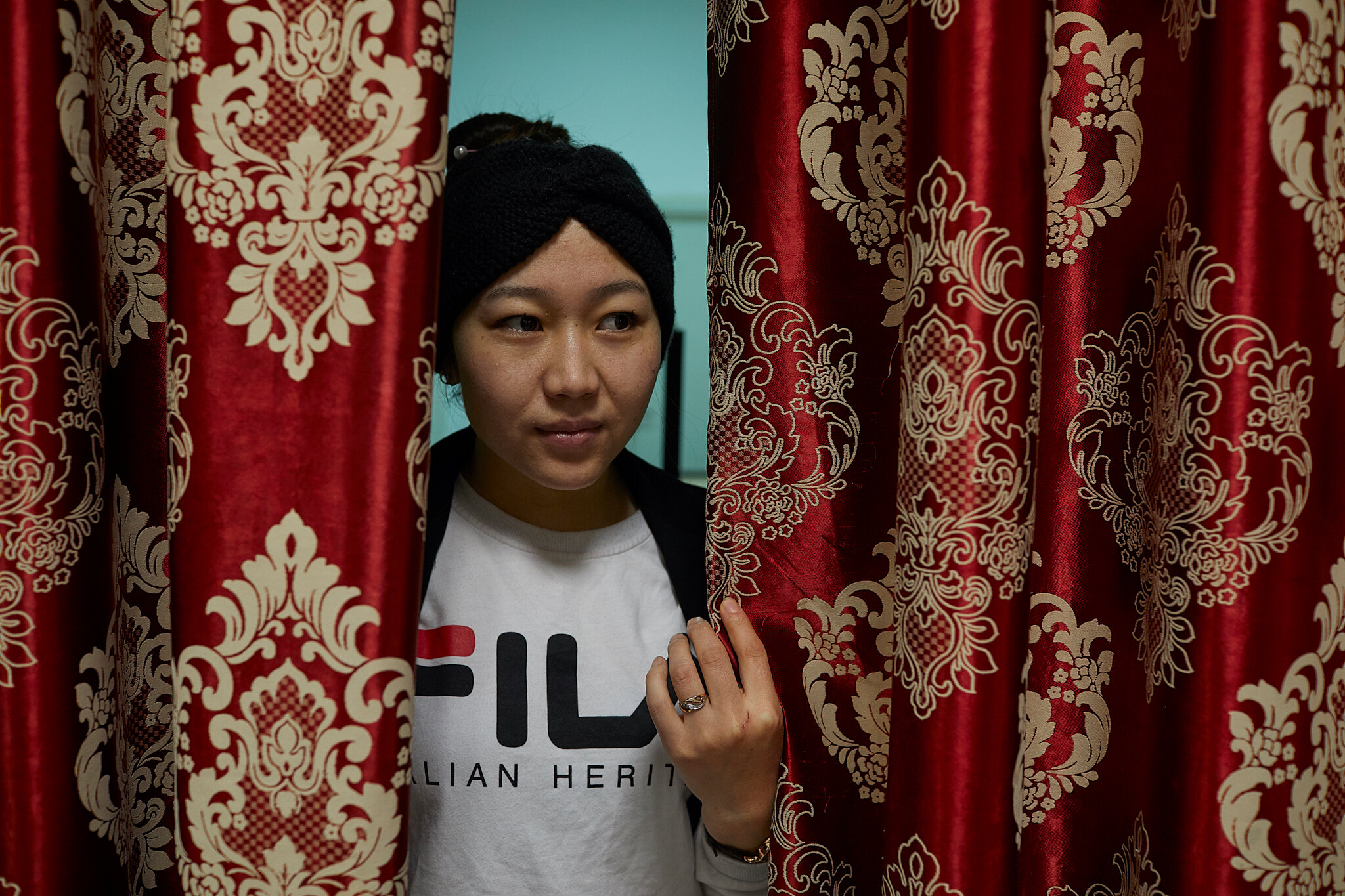
Russia, Moscow, chaikhana “Uzgen”, 11/10/2019. The portrait of Tahmina K. (25) in the chaikhana (teahouse) “Uzgen” she is working at. Tahmina sends money back home to Kyrgyzstan to support her mother, who cares for Tahmina’s four-year-old daughter. This is her second time living and working in Russia—her first, a six-year stint, began when she was 13.
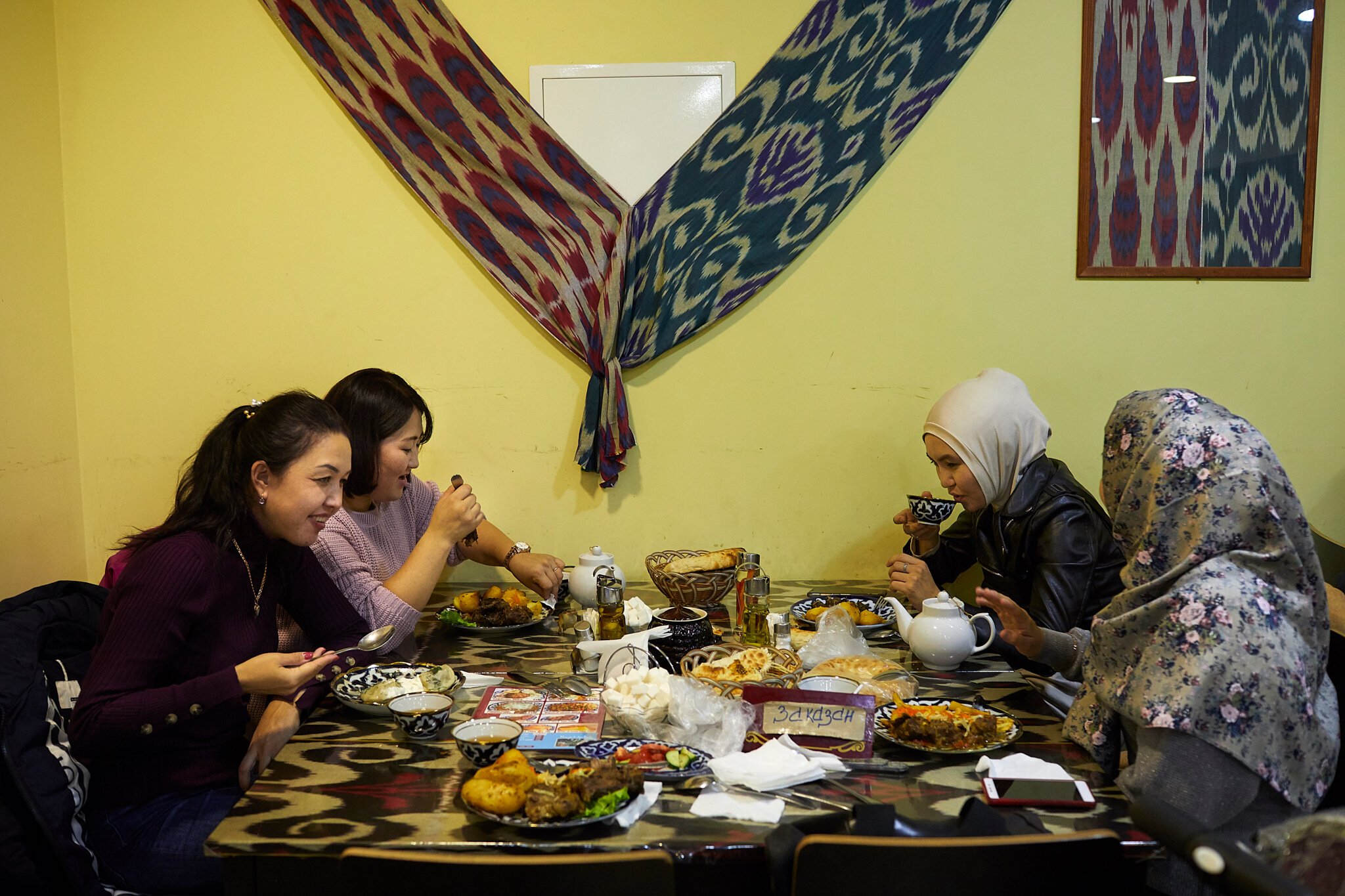
Russia, Moscow, 10/10/2019. Shahrizada Adanova is having dinner with her friends in Uzbek cafe in Paveletskaya Square 1.
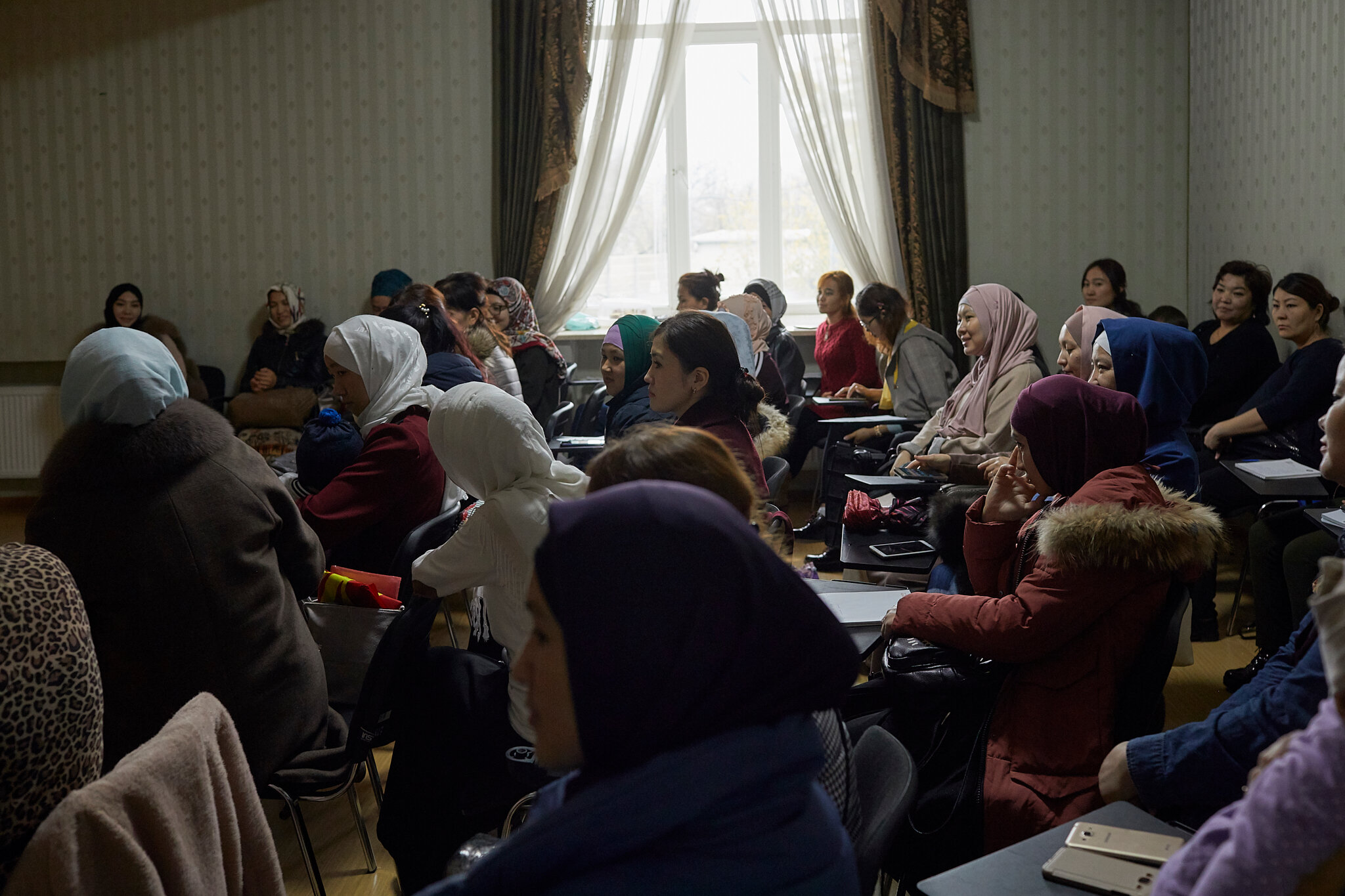
Russia, Moscow, 06/10/2019.The Sunday meeting of women from Kyrgyzstan organized by Shahrizada Adanova. Meetings with women are held almost every Sunday, Shahrizada and her organizational group (9 women) invite doctors and other specialists to give to women as much as they can. Shahrizada gets the messages from the husbands of the women who attend the meetings. They are asking why is it needed, why are the women rights needed. They say she is ruining their families by her activity.
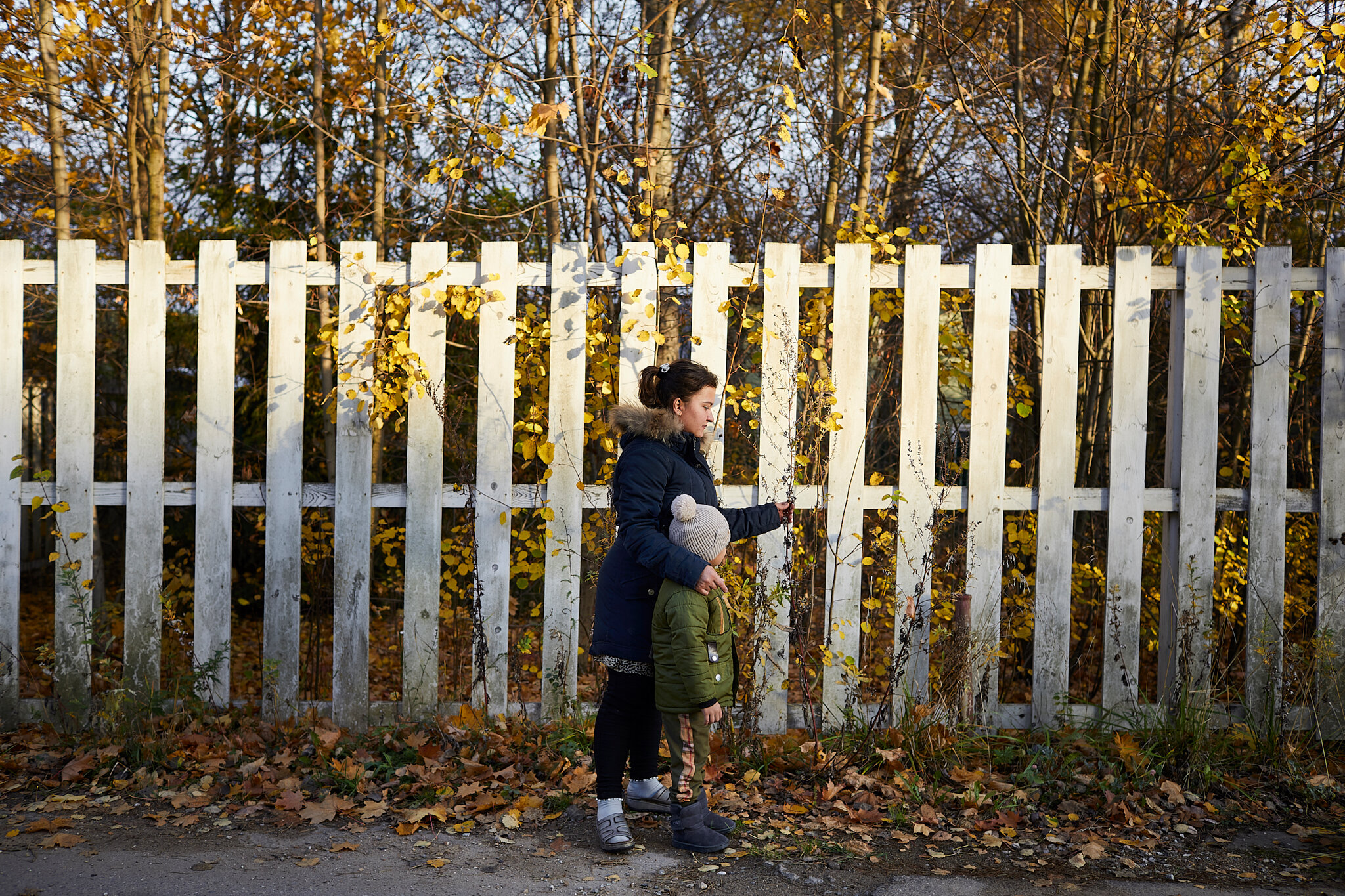
Russia, Moscow oblast, Odintsovo city district, Perhushkovo village, 05/10/2019. Zarina U.,19, with Elnur Zarinov, 5, on a walk. Zarina is from Qashqadaryo region in Uzbekistan and works as a babysitter. She takes care of brothers Elyor in a village outside Moscow. Zarina’s mother and the boys’ grandmother, friends back in Uzbekistan, arranged for Zarina to go to Russia to stay with them while their parents work. Zarina’s mother is saving Zarina’s wages to build a family house in Uzbekistan. Zarina was supposed to return home in 2020, but after the border was closed because of COVID-19, she moved to Moscow to work.
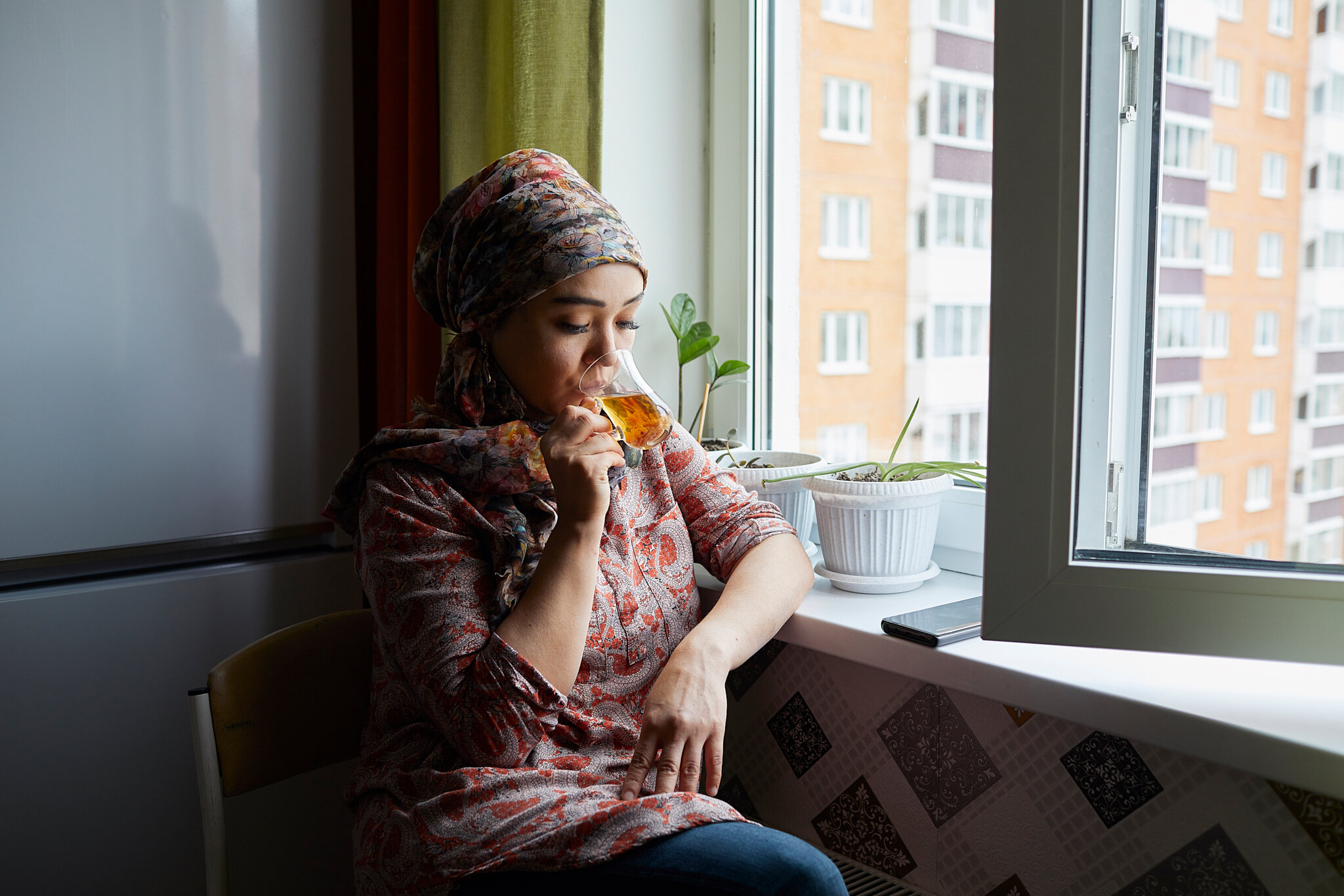
Russia, Domodedovo, 07/10/2019. Venera Bokotaeva from Kyrgyzstan in her own flat in Domodedovo, Moscow Oblast, Russia. Venera runs a support organization for Kyrgyz women called Bakyt (Kyrgyz for “happiness”). Venera, who has degrees in law and international relations and experience as a dressmaker and seamstress, brought a diverse set of skills with her to Russia when she moved there with her husband in 2017.
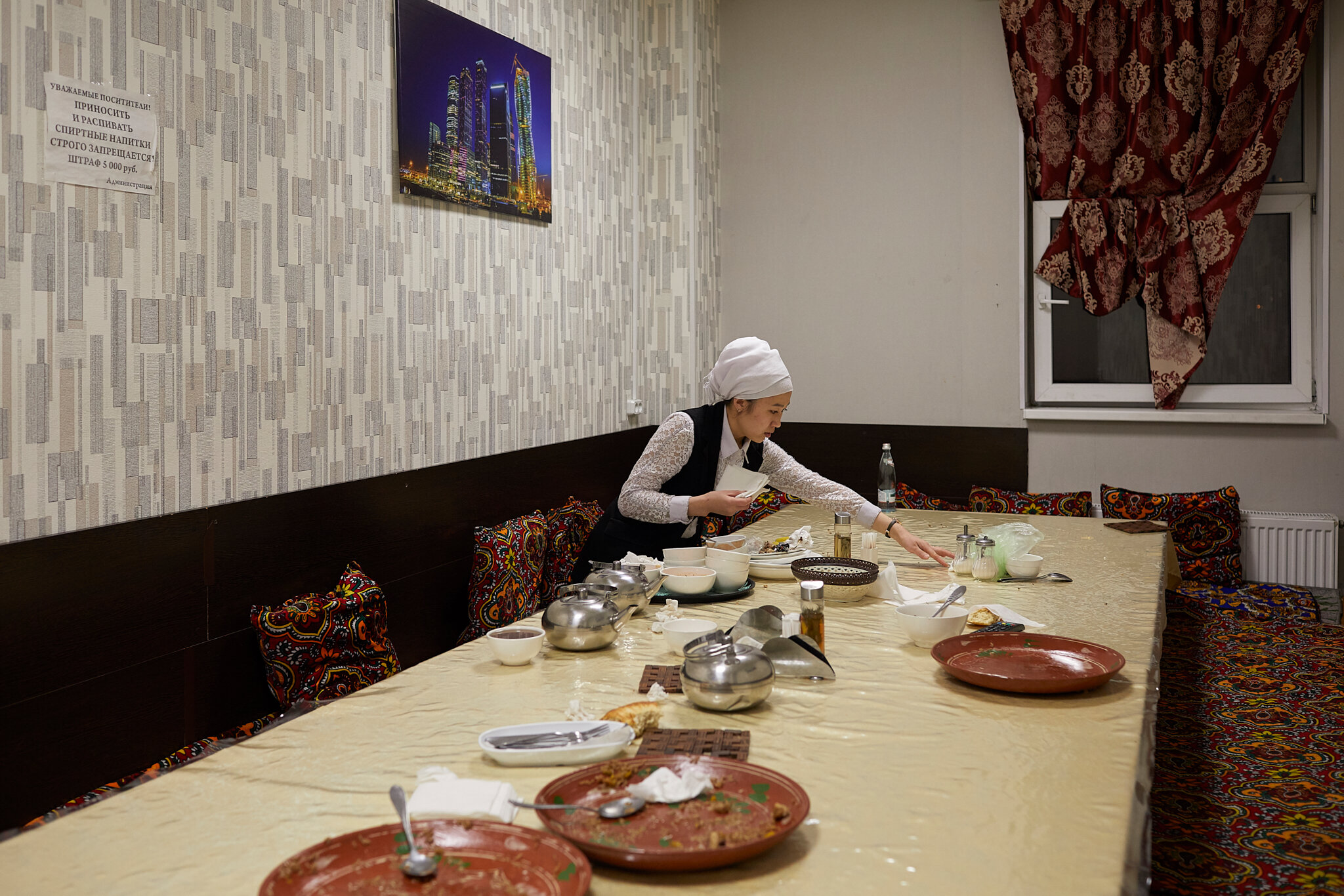
Russia, Moscow, chaikhana “Uzgen”, 04/10/2019. Tahmina K., 25, cleans the room after the guests. The chaikhana “Uzgen” consists of separate rooms. Each room is decorated with traditional carpets “Toshok” and pillows. The chaikhana “Uzgen” is open 24/7. Tahmina sends money back home to Kyrgyzstan to support her mother, who cares for Tahmina’s four-year-old daughter. This is her second time living and working in Russia—her first, a six-year stint, began when she was 13.
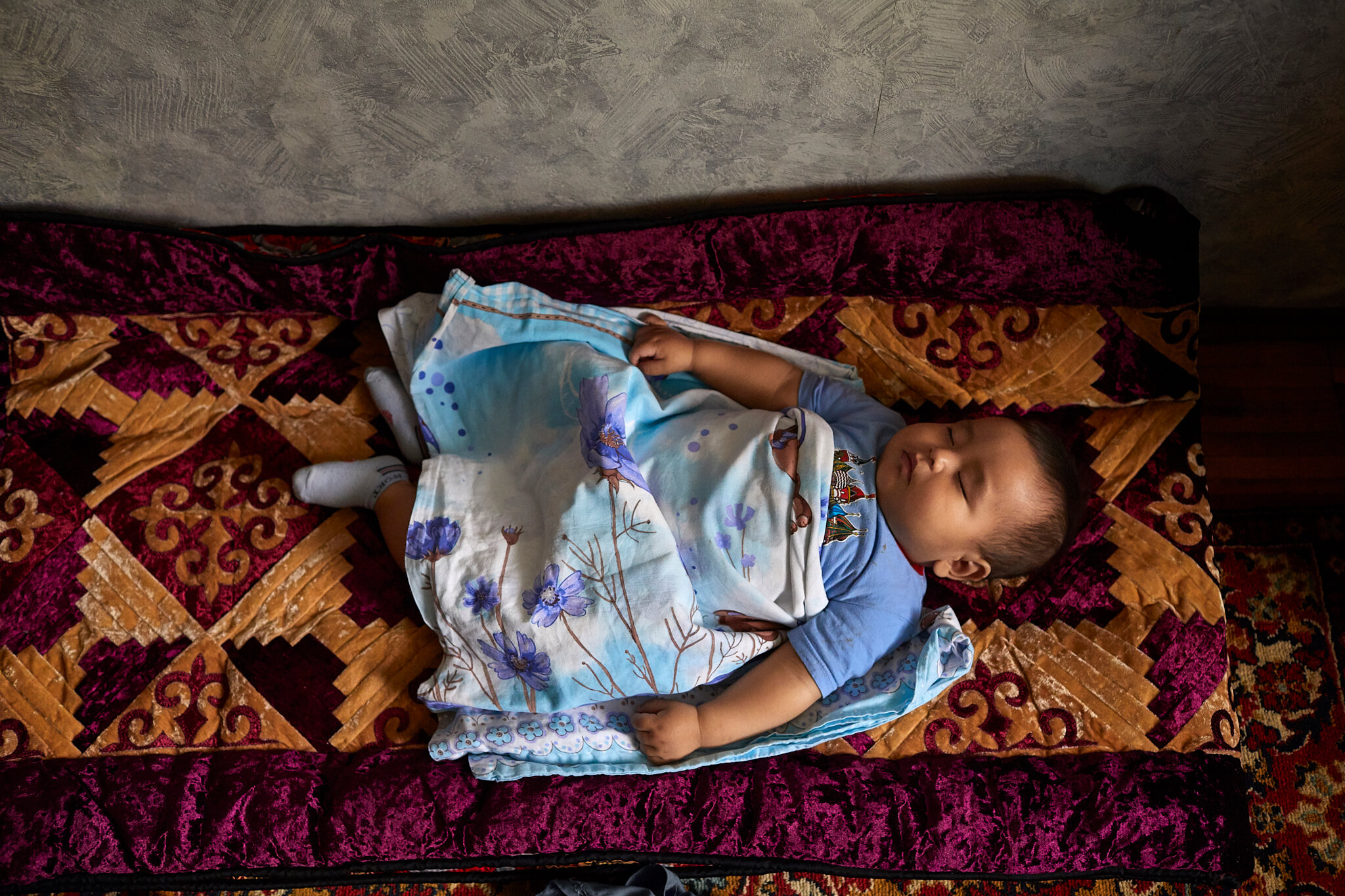
Russia, Moscow, 08/10/2019. 8-months old Kagan Adanov is sleeping on the national kyrgyz carpet “toshok”.
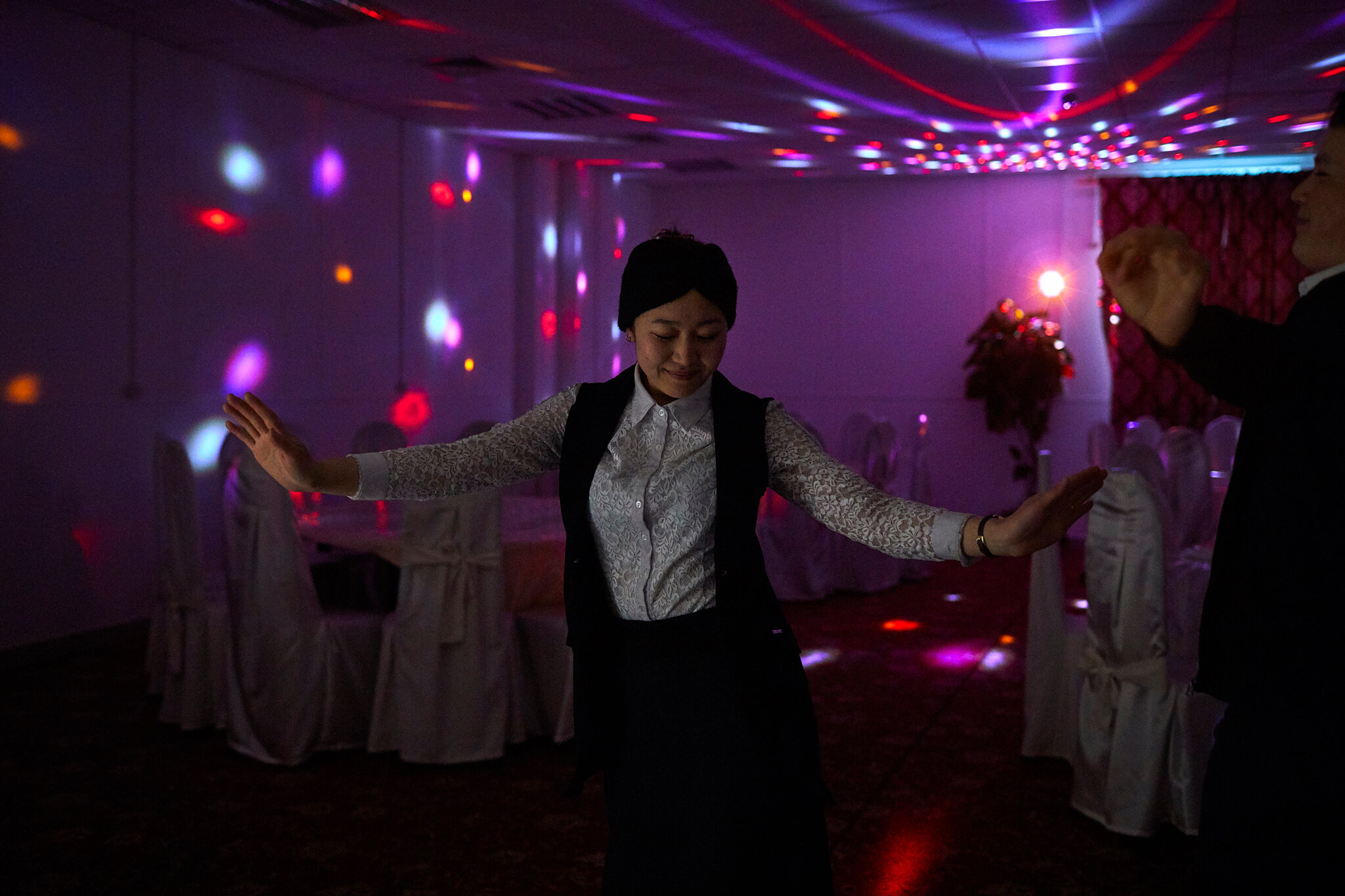
Russia, Moscow, chaikhana “Uzgen”, 11/10/2019. Tahmina K., 25, is dancing in the chaikhana (teahouse) “Uzgen” she is working at. The chaikhana “Uzgen” is open 24/7. The week was very busy and Tahmina slept at the cafe and hasn't been at home for a week. A big dinner was planned for this evening, Tahmina and her collegues checked the sound and lights for it.Tahmina sends money back home to Kyrgyzstan to support her mother, who cares for Tahmina’s four-year-old daughter. This is her second time living and working in Russia—her first, a six-year stint, began when she was 13.















Russia, Moscow, chaikhana “Uzgen”, 04/10/2019. Tahmina K., 25, cleans up after guests at a chaikhana, or Central Asian teahouse, in Moscow. Tahmina sends money back home to Kyrgyzstan to support her mother, who cares for Tahmina’s four-year-old daughter. This is her second time living and working in Russia—her first, a six-year stint, began when she was 13.
Russia, Moscow, 07/10/2019. Shahrizada Adanova (center, in hijab) welcomes friends at her home in Moscow to celebrate husband Kurmanek Shermatov’s (at left, holding their son Kagan) birthday. Shahrizada first came to Russia from Kyrgyzstan when she was 19 and took jobs as a department store cleaner and a cook. She moved back to Kyrgyzstan two years later and worked for the national television station but longed to return to Moscow. She met Kurmanek, a Kyrgyz mining engineer living in Russia, online and moved back to Russia three years ago.
Russia, Moscow, Moscow Cathedral mosque, 04/10/2019. Women are waiting for the Friday prayer to begin. Women and men have separated areas. A big screen is installed so that women can see the imam. The Friday prayer or Jumu'ah is led by a sermon given by Imam (the leader of the mosque) to educate, guide and propagate Islam. Jumu'ah is obligatory for Muslim men who are above the age of puberty and meet certain requirements to pray in congregation either in the mosque of the city they live in or with a group of Muslims. Women are recommended to also do so at home, but not obligated.They all sit down facing the front of the mosque, which will be in the direction of Mecca. This direction is called the qiblah. Wherever a Muslim is praying, he or she is required to face the qiblah before beginning. The qiblah is easily recognizable in a mosque thanks to a structure called the mihrab, or prayer.
Russia, Moscow oblast, Odintsovo city district, Perhushkovo village, 05/10/2019. Zarina U., 19, takes care of brothers Elyor, five (at right), and Elnur, three, in a village outside Moscow. Zarina’s mother and the boys’ grandmother, friends back in Uzbekistan, arranged for Zarina to go to Russia to stay with them while their parents work. Zarina’s mother is saving Zarina’s wages to build a family house in Uzbekistan. Zarina was supposed to return home in 2020, but after the border was closed because of COVID-19, she moved to Moscow to work.
Russia, Moscow, 07/10/2019. Shahrizada plays with eight-month-old Kagan. She started the Aiymdar KG organization to help other Kyrgyz women in Moscow navigate life in Russia and to provide a safe space to talk about relationships and family matters. A dozen women run the organization, which serves some 200 women and raises money for scholarships for 10 orphaned children back in Kyrgyzstan.
Russia, Moscow, 11/10/2019. As a Muslim Shahrizada Adanova prays five times a day. She first came to Russia from Kyrgyzstan when she was 19 and took jobs as a department store cleaner and a cook. She moved back to Kyrgyzstan two years later and worked for the national television station but longed to return to Moscow. Shahrizada met Kurmanek, a Kyrgyz mining engineer living in Russia, online and moved back to Russia three years ago. She started the Aiymdar KG organization to help other Kyrgyz women in Moscow navigate life in Russia and to provide a safe space to talk about relationships and family matters. A dozen women run the organization, which serves some 200 women and raises money for scholarships for 10 orphaned children back in Kyrgyzstan.
Russia, Moscow, 08/10/2019. Shahrizada Adanova (26) with her 8-months old son Kagan Adanov rides the Moscow subway to her show-room. Shahrizada came alone to Moscow when she was 19. She worked as a cleaner in the big department store, then as a helper in the kitchen, then as a cook. At the age of 21 she moved back to Kyrgyzstan and worked there at the national television, but she missed Moscow and wanted to come back. While in Kyrgyzstan she met online a man from Kyrgyzstan, who lived in Moscow. Shortly they got married and it’s been 3 years since she moved to Moscow. They have a 8-month old boy. Shahrizada opened a clothing shop with her own line that offers modern, modest fashions suitable for Muslim women as well as Kyrgyz traditional clothing—including a popular full-length dress with a strategically placed zipper for easy breastfeeding.
Russia, Moscow, chaikhana “Uzgen”, 11/10/2019. The portrait of Tahmina K. (25) in the chaikhana (teahouse) “Uzgen” she is working at. Tahmina sends money back home to Kyrgyzstan to support her mother, who cares for Tahmina’s four-year-old daughter. This is her second time living and working in Russia—her first, a six-year stint, began when she was 13.
Russia, Moscow, 10/10/2019. Shahrizada Adanova is having dinner with her friends in Uzbek cafe in Paveletskaya Square 1.
Russia, Moscow, 06/10/2019.The Sunday meeting of women from Kyrgyzstan organized by Shahrizada Adanova. Meetings with women are held almost every Sunday, Shahrizada and her organizational group (9 women) invite doctors and other specialists to give to women as much as they can. Shahrizada gets the messages from the husbands of the women who attend the meetings. They are asking why is it needed, why are the women rights needed. They say she is ruining their families by her activity.
Russia, Moscow oblast, Odintsovo city district, Perhushkovo village, 05/10/2019. Zarina U.,19, with Elnur Zarinov, 5, on a walk. Zarina is from Qashqadaryo region in Uzbekistan and works as a babysitter. She takes care of brothers Elyor in a village outside Moscow. Zarina’s mother and the boys’ grandmother, friends back in Uzbekistan, arranged for Zarina to go to Russia to stay with them while their parents work. Zarina’s mother is saving Zarina’s wages to build a family house in Uzbekistan. Zarina was supposed to return home in 2020, but after the border was closed because of COVID-19, she moved to Moscow to work.
Russia, Domodedovo, 07/10/2019. Venera Bokotaeva from Kyrgyzstan in her own flat in Domodedovo, Moscow Oblast, Russia. Venera runs a support organization for Kyrgyz women called Bakyt (Kyrgyz for “happiness”). Venera, who has degrees in law and international relations and experience as a dressmaker and seamstress, brought a diverse set of skills with her to Russia when she moved there with her husband in 2017.
Russia, Moscow, chaikhana “Uzgen”, 04/10/2019. Tahmina K., 25, cleans the room after the guests. The chaikhana “Uzgen” consists of separate rooms. Each room is decorated with traditional carpets “Toshok” and pillows. The chaikhana “Uzgen” is open 24/7. Tahmina sends money back home to Kyrgyzstan to support her mother, who cares for Tahmina’s four-year-old daughter. This is her second time living and working in Russia—her first, a six-year stint, began when she was 13.
Russia, Moscow, 08/10/2019. 8-months old Kagan Adanov is sleeping on the national kyrgyz carpet “toshok”.
Russia, Moscow, chaikhana “Uzgen”, 11/10/2019. Tahmina K., 25, is dancing in the chaikhana (teahouse) “Uzgen” she is working at. The chaikhana “Uzgen” is open 24/7. The week was very busy and Tahmina slept at the cafe and hasn't been at home for a week. A big dinner was planned for this evening, Tahmina and her collegues checked the sound and lights for it.Tahmina sends money back home to Kyrgyzstan to support her mother, who cares for Tahmina’s four-year-old daughter. This is her second time living and working in Russia—her first, a six-year stint, began when she was 13.